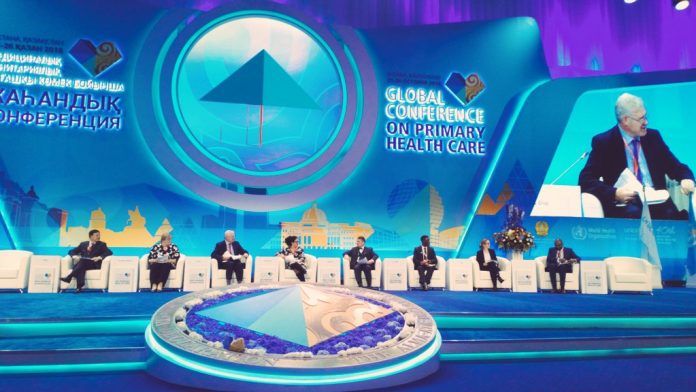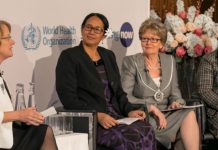
ICN and Nursing Now call for nurses to work to full capacity to achieve vision of Astana Declaration
Astana, Kazakhstan; Geneva, Switzerland; 26 October 2018 – The International Council of Nurses (ICN) and Nursing Now today called on governments to remove barriers that impede nurses to work to their full scope to achieve the vision set out in the Astana Declaration. The joint statement was made during the Global Conference on Primary Health Care in Astana, Kazakhstan, 25-26 October, celebrating the 40th Anniversary of the Declaration of Alma-Ata.
ICN and Nursing Now played a key role in bringing the nursing voice to this landmark event. Dr Isabelle Skinner, ICN’s Chief Executive Officer was on the panel of the joint WONCA/ICN/FIP1 side event on Who Needs to be in the Modern Primary Care Team to Achieve Universal Health Care. Lord Nigel Crisp, Co-Chair of the Nursing Now campaign, moderated a session on Primary Health Care Workforce, and Howard Catton, ICN’s Director of Nursing and Health Policy and Barbara Stilwell, Executive Director, Nursing Now Global Campaign, took part in a parallel session at the Astana Conference on Empowering People at the Centre of Primary Health Care, speaking on The Voice of Women, Nurses and Midwives.
“People must be at the centre of healthcare delivery and able to lead decisions about how their own health is managed and delivered” said Howard Catton. “Putting people first is at the centre of nursing philosophy and practice and nurses have a critical role to play in making a reality of people centred and integrated health care.”
Lord Nigel Crisp, Co-Chair of the Nursing Now Campaign emphasized that “a new model of primary health care is emerging with nurses at its heart. They are the health professionals who are closest to the community and can coordinate care, deliver services and work with local people on health promotion, disease prevention and health literacy.”
Both ICN and Nursing Now have endorsed the Civil Society Statement which calls on governments to strengthen political leadership and governance; improve financing; enhance accountability; and advance country-led solutions.
“ICN strongly believes that political will is vital to delivering the ambitions of the Astana Declaration” said Dr Isabelle Skinner, ICN CEO, during her presentation at the PHC Conference in Astana. “We call on Ministries of Health to integrate PHC as the foundation of their health systems and ensure adequate financial investments in PHC”.
ICN, as the global voice of the over 20 million nurses worldwide, strongly believes that the effective and safe delivery of comprehensive PHC services depends on the strength, capacity and capability of the health workforce. Since nurses make up more than 50 % of the global health workforce, ICN calls on governments to make it possible for nurses to work to their full capacity to achieve the vision set out in the Astana Declaration.
According to health workforce experts there will be a global shortage of 7.6 million nurses and midwives by 2030. Reflecting on the Astana Declaration’s commitment to ensuring an adequate public health and primary care workforce to address modern health needs, the joint ICN/Nursing Now statement emphasized that appropriate remuneration and financial resources should be in place to support this workforce.
Annette Kennedy, President of ICN, highlighted that “Ensuring health is a human right is a priority for ICN and a strategic focus of our 2017 and 2018 International Nurses Day resources which highlight how nurses are improving access to health care. Throughout my work as a Commissioner of the WHO Global Commission on Noncommunicable Diseases, I have stressed the important role of nurses in disease prevention and I join my colleagues at Nursing Now to support the commitment of the Astana Declaration to ensuring investment in the healthcare workforce to deliver quality primary healthcare to all.”
The Global Conference on Primary Health Care, co-hosted by the Government of Kazakhstan, WHO and UNICEF, aims to renew a commitment to primary health care to achieve universal health coverage and the Sustainable Development Goals. More information on the outcomes of the meeting can be found here.
The International Council of Nurses (ICN) is a federation of more than 130 national nurses’ associations representing the millions of nurses worldwide. Operated by nurses and leading nursing internationally, ICN works to ensure quality care for all and sound health policies globally.
Nursing Now is a three-year global campaign run in collaboration with the International Council of Nurses and the World Health Organization. Nursing Now is run by a Campaign Board made up of nurses and non-nurses from 16 different countries. The campaign is a programme of the Burdett Trust for Nursing.




